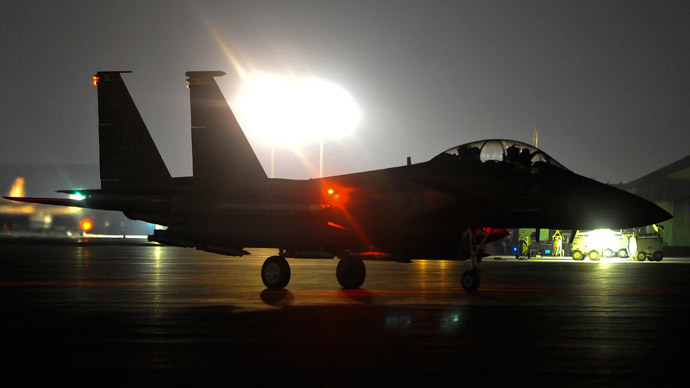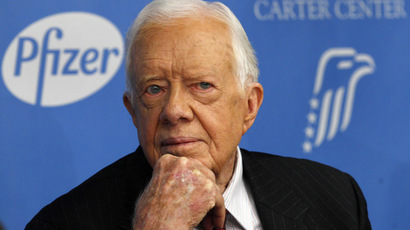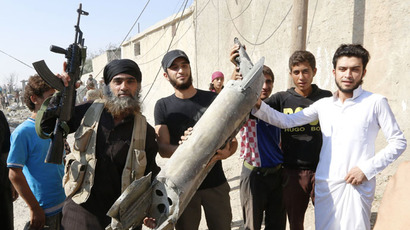US blames news reports for air strike failures

American intelligence officials are trying to blame news reports for failed military attacks against shadowy jihadist groups, arguing that the articles alerted a new terror group to impending air strikes.
Last month, the United States fired 46 cruise missiles at eight locations in northern Syria to target the Khorasan group’s training camps, a munitions center and other sites. However, the attacks only killed one or two key militants, US officials told the Associated Press.
The strikes near a compound in Aleppo didn’t cripple the group because members were able to scatter – something they blamed on news reports highlighting US missile plans. This led to the escape of a French-born jihadi with military skills that officials say they were interested in targeting.
READ MORE:ISIS now controls 40% of Kobani – top US official
The US-led airstrikes are attacking two sets of enemies in the region: the Islamic State, a growing movement of jihadists seeking to create their own caliphate in the Middle East, and the Khorasan group – a shadowy organization affiliated with Al-Qaeda that’s said to be plotting against Europe and the US.
“The strikes were certainly effective in setting back the Khorasan Group, but no one thinks they were a permanent solution or a death blow to the threats that come from this cell,” said Rep. Adam Schiff (D-Calif.), a member of the House Intelligence Committee, the AP reported.
One of the cruise missiles, however, killed a dozen civilians in a town west of Aleppo, according to local activist Mohammed Abu Omar.
In wake of reports US bombs killed Syrian civilians, WH says: our "strict bombing standards" don't apply to Syria https://t.co/QdY1SZgtq2
— Glenn Greenwald (@ggreenwald) September 30, 2014
The air strikes were justified because US intelligence reports showed Khorasan “was in the final stages of plans to execute major attacks against Western targets and potentially the U.S. homeland,” according to Army Lt. Gen William Maybille, the director of operations for the Joint Chiefs of Staff at the Pentagon.
Separate strikes of 200 missiles, bombs and rockets were made on the same date against 22 Islamic State targets in north-central and eastern Syria, according to Pentagon officials.
Officials say the US lacks a network of spies, bases and on-the-ground technology, which gives it limited intelligence about the Khorasan Group – the kind of help it used to carry out its work in Afghanistan, Iraq and Yemen.
Officials added that it was news stories last month, including a September 13 report by the AP, which disclosed the group’s significance, causing members to flee before they had a chance to make their strikes.
READ MORE:Jimmy Carter slams Obama’s handling of ISIS: ‘We waited too long’
The Huffington Post asked AP about the criticism leveled at it by the government over its reporting. Eric Madgian White responded:
“The Associated Press can speak only for itself and its reporting. The AP’s Sept. 13 story revealing the name and other details about the Khorasan Group was the product of weeks of reporting with sources, most of whom were not authorized to discuss the matter publicly. Representatives of the U.S. government asked the AP to withhold from the story some details AP had confirmed, but the AP declined to do that.”














